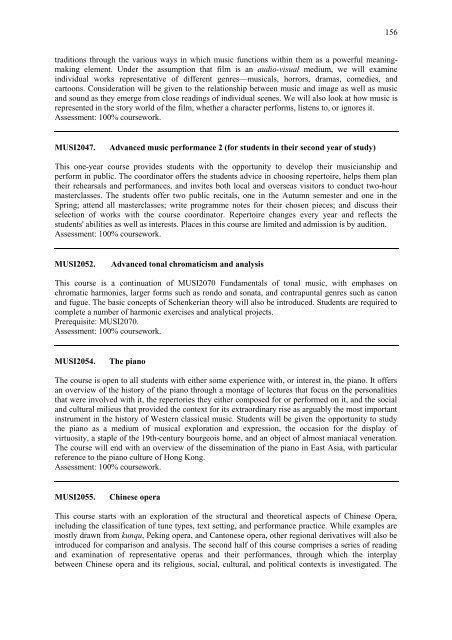(BA) (4-year-programme) - The University of Hong Kong
(BA) (4-year-programme) - The University of Hong Kong
(BA) (4-year-programme) - The University of Hong Kong
Create successful ePaper yourself
Turn your PDF publications into a flip-book with our unique Google optimized e-Paper software.
156traditions through the various ways in which music functions within them as a powerful meaningmakingelement. Under the assumption that film is an audio-visual medium, we will examineindividual works representative <strong>of</strong> different genres––musicals, horrors, dramas, comedies, andcartoons. Consideration will be given to the relationship between music and image as well as musicand sound as they emerge from close readings <strong>of</strong> individual scenes. We will also look at how music isrepresented in the story world <strong>of</strong> the film, whether a character performs, listens to, or ignores it.Assessment: 100% coursework.MUSI2047.Advanced music performance 2 (for students in their second <strong>year</strong> <strong>of</strong> study)This one-<strong>year</strong> course provides students with the opportunity to develop their musicianship andperform in public. <strong>The</strong> coordinator <strong>of</strong>fers the students advice in choosing repertoire, helps them plantheir rehearsals and performances, and invites both local and overseas visitors to conduct two-hourmasterclasses. <strong>The</strong> students <strong>of</strong>fer two public recitals, one in the Autumn semester and one in theSpring; attend all masterclasses; write <strong>programme</strong> notes for their chosen pieces; and discuss theirselection <strong>of</strong> works with the course coordinator. Repertoire changes every <strong>year</strong> and reflects thestudents' abilities as well as interests. Places in this course are limited and admission is by audition.Assessment: 100% coursework.MUSI2052.Advanced tonal chromaticism and analysisThis course is a continuation <strong>of</strong> MUSI2070 Fundamentals <strong>of</strong> tonal music, with emphases onchromatic harmonies, larger forms such as rondo and sonata, and contrapuntal genres such as canonand fugue. <strong>The</strong> basic concepts <strong>of</strong> Schenkerian theory will also be introduced. Students are required tocomplete a number <strong>of</strong> harmonic exercises and analytical projects.Prerequisite: MUSI2070.Assessment: 100% coursework.MUSI2054.<strong>The</strong> piano<strong>The</strong> course is open to all students with either some experience with, or interest in, the piano. It <strong>of</strong>fersan overview <strong>of</strong> the history <strong>of</strong> the piano through a montage <strong>of</strong> lectures that focus on the personalitiesthat were involved with it, the repertories they either composed for or performed on it, and the socialand cultural milieus that provided the context for its extraordinary rise as arguably the most importantinstrument in the history <strong>of</strong> Western classical music. Students will be given the opportunity to studythe piano as a medium <strong>of</strong> musical exploration and expression, the occasion for the display <strong>of</strong>virtuosity, a staple <strong>of</strong> the 19th-century bourgeois home, and an object <strong>of</strong> almost maniacal veneration.<strong>The</strong> course will end with an overview <strong>of</strong> the dissemination <strong>of</strong> the piano in East Asia, with particularreference to the piano culture <strong>of</strong> <strong>Hong</strong> <strong>Kong</strong>.Assessment: 100% coursework.MUSI2055.Chinese operaThis course starts with an exploration <strong>of</strong> the structural and theoretical aspects <strong>of</strong> Chinese Opera,including the classification <strong>of</strong> tune types, text setting, and performance practice. While examples aremostly drawn from kunqu, Peking opera, and Cantonese opera, other regional derivatives will also beintroduced for comparison and analysis. <strong>The</strong> second half <strong>of</strong> this course comprises a series <strong>of</strong> readingand examination <strong>of</strong> representative operas and their performances, through which the interplaybetween Chinese opera and its religious, social, cultural, and political contexts is investigated. <strong>The</strong>
















